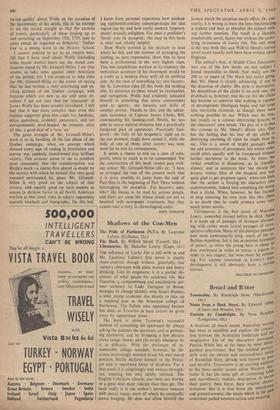Shadows of the Con-Men
The Pride of Parthenon (N.Y.). By Laurence Lafore. (Gollancz, 21s.) THE influence of Lucky Jim is still with us and Mr. Laurence Lafore's first novel is clearly Amis-inspired, though without, gratefully, that author's obsession with plain women and heavy drinking. Like its originator, it is a partial dis- closure of what passes for academic life. Nic Traverne, a compromising and unscholastic pri- vate secretary to Lady Tarragon in Rome, arranges to change identity with Stuart Hunter, a solid young academic due shortly to take up a teaching post in the American college of Parthenon. The Fellow who appointed Hunter has died, so Traverne at least cannot be given away by appearance alone.
The book is about Traverne's successful method of concealing his ignorance by always asking the students the questions, and so generat- ing discussion, and by dropping a few phrases about image themes and life-motifs whenever he is in difficulty. With the disclosure of in- numerable college scandals, however, he be- comes increasingly worried about his own moral position, finally declares himself to the Princi- pal and is appointed Dean of Students. For a first novel it is surprisingly well written through- out, amusing but only mildly satirical. The English Literature schools, one feels, are worthy of a great deal more ridicule than they get. The fault really is in the author's intrusive concern with moral issues, most of which he eventually leaves hanging. He does not allow himself the
licence which the situation surely offers. Or, con- trarily, it is wrong to have the hero blackmailing
a student and then to abandon the subject with- out further mention. The result is a likeable, comfortable novel, funny but without the under-
lying seriousness of Lucky Jim. The odd thing is the way both this and Wilfrid Sheed's second novel could equally well have been written about England.
The author's first, A Middle Class Education, was one of the few books on any subject I found impossible to finish. Nor really are the 200 or so pages of The Hack any easier going. But Mr. Sheed is clearly advancing, if not in the direction of clarity. His style is destructive; his demolition of the cliché is an acid one; the drawback is, however, that his ear for the cliché has become so sensitive that nothing is capable of development. Dialogues begin and tail awaY into inevitable etceteras, as though there were nothing possible to say. Which may be true, but results in a curious destroying process in the characters' own minds. The pity of it is that this extends to Mr. Sheed's efforts also. One has the feeling that his fear of the cliché is destroying anything of value he might have ,to say. This is a novel of bright passages with the odd moments of perception, but whose order could often equally well be transposed without further detriment to the book. At times the verbal rebellion is disastrous, as in 'equallY- almost,' and in sentences like 'she missed the drowsy rubber bliss of the hospital and was quite glad to get pregnant again,' when one feels that the author is forcing his characters into understatement, indeed into something far worse, than a cliché. When, however, he has learnen to stop smearing his own style like this, there is no doubt that he could produce some verY much better novels. Ultramarine is the first novel of Malcolni. Lowry, somewhat revised before he died. Again it is made up of passages of dialogue alternat- ing with rather more lyrical passages of retr°- spective reflection. Many of the dialogue passages now seem unnecessarily long, much of the re- flection repetitive, but it has occasional moments of power, as when the young hero is about ta dive overboard in order to rescue a pigeon .1a order to win respect, but wins more by refrain- ing. For anyone interested in Lowry's later development it will obviously have a certain interest. MALCOLM RUTHERFORD


































 Previous page
Previous page